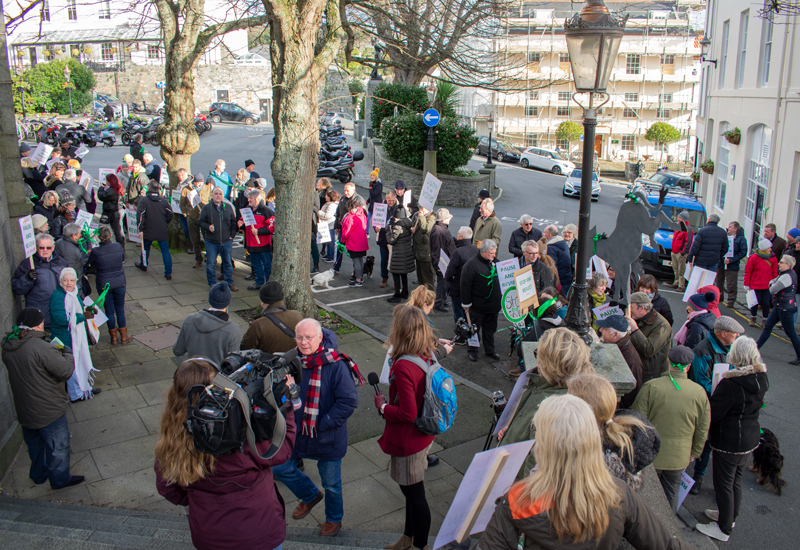


The Education, Sport & Culture Committee has failed to work with professionals on operational details that will help school staff to maximise the learning potential of students, union representatives have said, as they renewed calls for the neglected 'pause and review'.
The open letter to States Deputies ahead of next week's debate has been signed off by Connie Armstrong from the NEU, Victoria Wallace from NASUWT, Stephen Langford from Prospect, Charlie Towers from UCU and Helen Shepherd from NAHT.
"As unions we’d like nothing better than to be able to say publicly that we don’t oppose what’s being proposed, as this would help you all to vote with confidence," they wrote.
"Instead, we are so short of detail that sadly we can only identify problems. ESC argues that it should defer responsibility for the hard decisions around the implementation of its propositions to the so-called ‘educationalists’ and to school leaders once a model has been decided upon; we contend that it is much better to have worked through the detail, be certain what you propose is going to work, and take the workforce with you because they’ve been on the same journey."

Pictured: The previous States narrowly approved a 'pause and review' of the educational policy at the time, which was for one 11-18 school split across two sites. The review was then scrapped by its leader, Deputy Andrea Dudley-Owen, with the backing of the majority of the States earlier this year. Teachers want it to happen so there is a proper analysis of the different models and how they can help to maximise learning potential.
The local union reps emphasised that politicians "weary" of the education debate cannot use that as an excuse to lower their standards for the education system Guernsey students deserve.
"Ask yourself if you are convinced that 'action this day' will deliver the improvements necessary to ensure that educational outcomes are even equal to, let alone more favourable, than now?
"On behalf of those professionals that are less interested in models per se than in the States furnishing those who work in our schools with the resources required to deliver truly high quality education, this is the most critical question to be answered."
"Dear Members of the States of Deliberation,
When we met with you recently, we were asked what model of secondary education we – and by extension – our members favoured. We declined to answer that question because: (i) it is not our role to set policy; and (ii) as has become evident in recent weeks, there are many different perspectives among our members based on how they perceive their own school/institution will be impacted by whichever is the latest set of proposals to emanate from ESC or elsewhere.
You may ask why there are such divergent views? ESC will have you believe that there is no ‘silver bullet’. On one level that is true; there is no one model around which the majority of school staff will immediately coalesce. However, we would argue that the wrong question is continually being asked.
If it were not for politics, very few staff that work in schools would be spending their time debating the pros and cons of different ‘models’. What they are more interested in is how well their schools are resourced and how they can best operate so that their students can maximise their potential as learners; in other words, the operational detail matters. Unfortunately, insufficient time has been spent on working through this with school staff, despite all the consultation/engagement that has occurred.
Policy-making is traditionally from the top down; you design your strategy, get agreement to it and then set about implementing it. However, if the preferred policy has so many obstacles that it cannot be implemented, the process is fundamentally flawed. In the matter of our secondary schools this is particularly relevant, as policy-making cannot operate in a vacuum. Having a theoretical model is fine if you’re starting with a blank sheet of paper, but this isn’t the case here; instead we have two recently built/redeveloped schools – St Sampson’s and Les Beaucamps – but both constructed before the end of selection; another school that is need of some upgrading - Les Varendes – no longer operating as the Grammar School for which it was built; and a fourth – La Mare de Carteret – which is past its sell by date (though still delivering high quality education). The current Sixth Form Centre was also built as part of the EDP.
As a result, whatever model is selected there are going to be constraints to be overcome, as clearly these schools are not all going to be razed to the ground any time soon. So understanding and working through the operational issues is fundamental to successful implementation; and it’s why we’ve previously advocated that a a ‘bottom up’ rather than ‘top down’ approach be adopted, the operational details being discussed with school staff so they understand what can and cannot be achieved in different circumstances and, in the process, enabling the best solution to emerge through the consultative process, (which would, at the same time, build consensus by enabling staff to identify and problem solve as they went).
A brief history lesson shows that, following the acceptance of the 'Torode Amendment' at the start of this century, there were plans to modernise the secondary schools on existing sites to bring their estate and facilities up to the standard of the then Grammar School – this was termed
the Education Development Programme (EDP) and resulted in the building of St Sampson’s High School and the rebuild of Les Beaucamps. The rebuild of La Mare de Carteret High School would have completed the programme, until there was a political intervention to rationalise the number of secondary schools to save money, both capital and revenue, since when there have been a series of political initiatives which have (variously) sought to:-
· reorganise secondary education along different lines with varying permutations of 11-16, 11-18, and separate 6th Form and Further Education 'models';
· transform secondary education to offer 'world class' teaching and learning – the avowed aim of the proponents of the ‘one school on two sites’ model;
· fulfil the ambitions and aspirations for States-provided education – the current proposals to replace 4 schools (3 x 11-16 and one 11-18) with 4 schools (3 x 11-16 and one 16 plus).
Since the abandonment of the EDP – which was all about building and facilities - the narrative has changed to be about transforming education, leading staff to believe that what was being designed was to benefit their learners and their schools. However, while the narrative was changed, insufficient attention has been paid to true educational transformation. Instead, the focus has remained on buildings and facilities; and hereafter what all of these initiatives have had in common is that they have fallen upon contact with reality. The limitations imposed by the existing estate and the perceived need to compromise space and (potentially) staffing standards in order to save money (despite 'no cost-savings' assertions) have resulted in significant levels of push-back from staff, concerned how their schools will successfully operate in their new configurations.
This was both understandable and entirely predictable. Add to these community concerns over traffic management, parental concerns around class sizes and facilities, and staff concerns encompassing these issues and others relating to curriculum breadth and delivery, pupil and staff transfers, etc. and the result is that it appears that people can't agree on what they do want.
So, where are we now?
Sadly, stakeholder confidence in the current ESC has ebbed away following the publication of its recent Policy Letter. Recent surveys undertaken by school staff show unanimous opposition to ESC’s proposals at Les Beaucamps and La Mare de Carteret, with 80% of staff at Les Varendes similarly opposed. As well as the concerns mentioned earlier, the Policy Letter appears to many staff as nothing more than a school closure dressed up as a 3-school model, but with a new 6th Form facility. Of particular concern, there is to be no investment in 11-16 education and a reorganisation of such funding that does exist to redress the imbalance between secondary and primary education – a cut by any other name; but, surprisingly, given the apparent investment being made in education, the Policy Letter mentions little about revenue costs.
So, how could you vote:-
a) support ESC's Policy Letter as it stands, knowing that it has failed to command the confidence of those who will have to deliver it?
b) seek to amend the Policy Letter by altering the 'model', but with no guarantee that any alternative will not prove to have just as significant implementation issues?
c) sursis the Policy Letter and instruct ESC to do the job that the pause and review requete was designed for – to bring forward a complete review along with supporting evidence, predicted revenue cost data and more detailed transition proposals?
As unions we’d like nothing better than to be able to say publicly that we don’t oppose what’s being proposed, as this would help you all to vote with confidence. Instead, we are so short of detail that sadly we can only identify problems. ESC argues that it should defer responsibility for the hard decisions around the implementation of its propositions to the so-called ‘educationalists’ and to school leaders once a model has been decided upon; we contend that it is much better to have worked through the detail, be certain what you propose is going to work, and take the workforce with you because they’ve been on the same journey.
At a time when money is tight it is important that resources are concentrated upon securing the staffing and facilities required to drive up student outcomes. Compromising space standards and using 'tipping point' metrics simply serves to tip the balance against our learners. However, this goes beyond what dedicated professionals want: Guernsey has few natural resources so it is vital that our community can attract and retain the high calibre personnel who will be central to ensuring that the Bailiwick's most valuable resource, its young people and future workforce, is fully prepared to take our island forward in the decades ahead.
Finally, to those of you weary of the all the comings and goings, and keen to make a decision and move on, ask yourself if you are convinced that 'action this day' will deliver the improvements necessary to ensure that educational outcomes are even equal to, let alone more favourable, than now? On behalf of those professionals that are less interested in models per se than in the States furnishing those who work in our schools with the resources required to deliver truly high quality education, this is the most critical question to be answered."
Comments
Comments on this story express the views of the commentator only, not Bailiwick Publishing. We are unable to guarantee the accuracy of any of those comments.